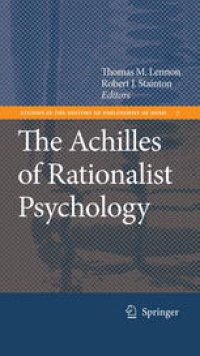
Ebook: The Achilles of Rationalist Psychology
- Tags: History of Philosophy, Philosophy, Philosophy of Mind, History of Science, Science general, Psychology general
- Series: Studies in the History of Philosophy of Mind 7
- Year: 2008
- Publisher: Springer Netherlands
- Edition: 1
- Language: English
- pdf
How is it that the mind perceives the words of a verse as a verse and not just as a string of words? One answer to this question is that to do so the mind itself must already be unified as a simple thing without parts (and perhaps must therefore be immortal). Kant called this argument the Achilles, perhaps because of its apparent invincibility, and perhaps also because it has a fatal weak spot, or perhaps because it is the champion argument of rationalism. The argument and the problem it addresses have a long history, from the ancient world right up to the present.
The Achilles of Rationalist Psychology consists of newly written papers addressing each of the main contributors to the discussion of the Achilles. Despite the historical importance and intrinsic interest of the argument, very little has been written about it. This volume should therefore be of use to advanced undergraduates, graduate students, and researchers across the domains of philosophy, history, and cognitive science.
How is it that the mind perceives the words of a verse as a verse and not just as a string of words? One answer to this question is that to do so the mind itself must already be unified as a simple thing without parts (and perhaps must therefore be immortal). Kant called this argument the Achilles, perhaps because of its apparent invincibility, and perhaps also because it has a fatal weak spot, or perhaps because it is the champion argument of rationalism. The argument and the problem it addresses have a long history, from the ancient world right up to the present.
The Achilles of Rationalist Psychology consists of newly written papers addressing each of the main contributors to the discussion of the Achilles. Despite the historical importance and intrinsic interest of the argument, very little has been written about it. This volume should therefore be of use to advanced undergraduates, graduate students, and researchers across the domains of philosophy, history, and cognitive science.